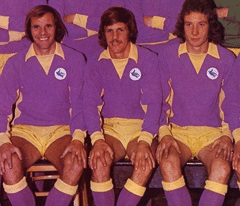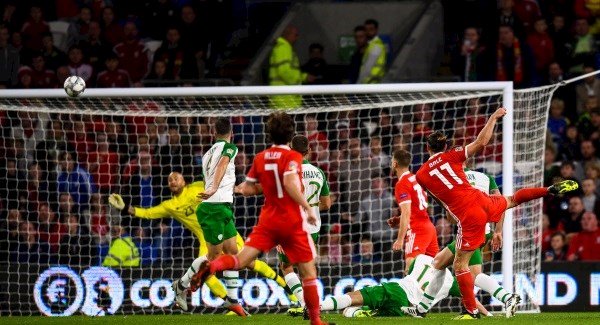
Much was made of Denmark’s strange build up to their Nations League game with Wales yesterday. The attitude of many reporters towards the dispute between the Danish squad and the game’s administrators in that country was one of wry amusement as the players in top two divisions of the country’s domestic league backed their international counterparts by refusing to accept selection for the national team in their place, hence the decision to field a team containing lower league performers. Futsallers and keepie uppie specialists for the friendly in Slovenia which was lost by the not too embarrassing margin of 3-0.
What the bust up did though was ensure that while Wales would be playing their second match in less than seventy two hours, Denmark’s best players would be coming into the game fresh following the decision to suspend resolution of the argument over match fees and commercial rights until after the first of their Nations League games have been played. So the possibility exists that the Danes could still face the Republic of Ireland next month with their “novelty” team next month.
Wales were also not helped by the fact that their flight to Denmark on Saturday evening was delayed because of “technical faults” with the plane.
So, all in all, there were reasons to fear that there would be an element of after the Lord Mayor’s show following the thrashing of the Irish on Thursday for the Welsh team – especially considering that the Danes currently stand ninth in the FIFA’s world rankings (we are nineteenth), they had gone twenty games unbeaten (not counting penalty shoot outs) before the Slovenia farce and had only let in nine goals in those matches.
The odds were against Wales even without the disadvantages of their opponents being fresher and the travel delay and, realistically, there were all sorts of reasons not to expect a performance as entertaining and enjoyable as the one seen against the Irish – if they did end up getting anything out of the match, it would be much more likely to have been down to a backs to the wall showing in an attritional affair.
“Attritional” was the right word to describe the opening half an hour of the game as Wales, with Chris Gunter restored at right back as Connor Roberts was pushed forward in place of David Brooks and James Chester back instead of Ashley Williams, comfortably dealt with isolated attacks from the home team while also suggesting themselves that they might be able to create something from their more fluently put together attacks.
Actually, to be more precise, Wales were able to pass the ball in non threatening areas with some fluency, but they were barely ever able get within shooting distance as a combination of the Danes defensive efficiency and the advantage they enjoyed in power ensured that they were never in any real danger of conceding a goal.
Certainly, it is hard to imagine that Denmark would have allowed Gareth Bale the time and space inside the penalty area that Wales gave to the home side’s best player, Christian Eriksen, in the thirty second minute as the Danes switched the ball to the right for Brentford’s Henrik Dalsgaard to deliver a low cross which left Eriksen with enough time and space to take a touch before scoring with a neat, low drive from fifteen yards which went in off a post.
On the face of it, one of Joe Allen or Ethan Ampadu should have been there to make scoring much more difficult than it was for Eriksen. The Spurs man had got beyond the pair of them though and he was able to prove what everyone knew anyway – that he had the quality to punish Wales for such carelessness.
Within minutes, Wales’ Man of the Match Wayne Hennessey was producing the first of three or four good saves he made as he flew to his left to keep out a viciously struck shot by Pione Sisto at the expense of a corner as the Danes upped the pace.
The home side were now showing that they had more to offer going forward than the rather laboured stuff they produced during their World Cup campaign which ended at the last sixteen stage with shoot out defeat to eventual finalists Croatia in a match where they were, arguably, the better side over the one hundred and twenty minutes.
Wales got through to half time just the one goal down though, so they were still well in the game although they must have known that they needed to up their attacking game considerably. Up to then it had only a Gareth Bale (given the captaincy in Williams’ absence) shot not too far wide of a post and a nice move which put Roberts free in the penalty area into a dangerous crossing position, which came to nothing, to recommend it.
If the closing stages of the first period had suggested the home side were getting on top, the opening period of the second half saw Wales coping better without really suggesting that an equaliser was coming.
However, the visitor’s task, already difficult given the quality of their fresher opponents and the distraction of that delayed flight, was made virtually impossible by the awarding of a very, very harsh penalty against Ampadu just past the hour mark.
One of the concerning legacies of a World Cup which contained so much that was good for me was the way that the otherwise very successful VAR system was applied to alleged handling offences by defending teams in their own penalty area. A number of very dodgy spot kicks were given on review for “offences” which seemed to be much more a case of ball to hand rather than the other way around.
What these decisions showed was the, bizarre in my view, official interpretation of what consists a handball in the area. Therefore, I suppose there shouldn’t have been too much surprise really at German referee Deniz Aytekin’s decision to point to the spot when substitute Viktor Fischer’s cross struck Ampadu’s slightly outstretched arm from a distance of about two yards, but that doesn’t make the decision a correct one in my book.
Eriksen duly scored to, essentially, end the game as a contest and the only question really in the closing stages was whether Denmark could increase the margin of their victory – they probably should have done, but I’m still of the opinion that, while the outcome might well have been the same, the way the closing stages would have panned out would have been a lot different were it not for that penalty award.
That said, there was some significance in the fact that the Danes second goal originated from Gareth Bale losing possession cheaply on the half way line because it tended to epitomise a night when Wales’ big guns simply didn’t fire. Bale might have been given more protection from a referee who tended to favour the home side throughout, but really it was a quiet night from him, the same applied to Aaron Ramsey, while Allen struggled manfully without achieving much and Ampadu, who was certainly a big gun on Thursday, experienced the other side of the game in what was a frustrating evening for him.
It will be the Republic of Ireland’s turn to play two group games during the international break next month as they host the Danes and us before things end in November with them travelling to Denmark who will then come to Cardiff for what, hopefully, will be a winner takes all encounter.
Just a quick mention of other Wales game played in the past few days. The Under 21s were unimpressive in beating group minnows Liechtenstein in Bangor on Friday evening – two goals by George Thomas in the first ten minutes seemingly set the home team on their way to the expected big win, but they were unable to add to them and ended up hanging on for the win. Mark Harris, who had a goal disallowed and then had to leave the field following a nasty looking clash of heads, and Cameron Coxe were the City representatives in a team which conceded late on and then were relieved to see a header come back off their own crossbar deep into added time – Wales now entertain Portugal on Tuesday in what is a must win game if they are to keep their faint Play Off hopes alive.
There was also another Wales win over the Republic of Ireland yesterday, this time at Under 19 level. City representation was provided by captain Ryan Reynolds, Sam Bowen, Dan Griffiths and Sion Spence (Isaak Davies was also on the bench), with Spence getting the game’s only goal – the sides meet again on Tuesday.



